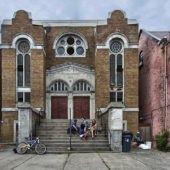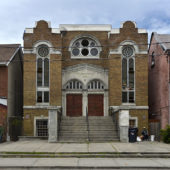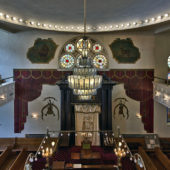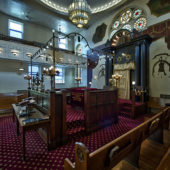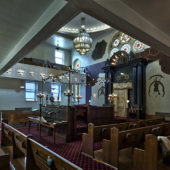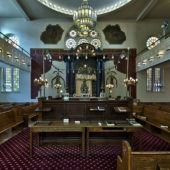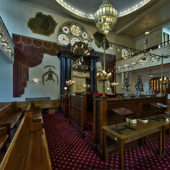The first Jewish congregation established in Toronto’s Kensington Market neighborhood.
The Minsk is located in Toronto’s Kensington Market district, near the city’s downtown. It is the last remaining downtown fully orthodox shul with daily services. At its peak the area had roughly 30 places of Jewish worship in Kensington Market ranging from modest shtiblach to buildings like Anshei Minsk.The Minsk originated as a landsmanshaft synagogue with its immigrant congregation based on a country, district or city of origin, in this case most of the Mink’s founders were Jewish immigrants from Minsk, Russia, who had settled in Kensington Market at the turn of the century. The area’s Jewish community has changed dramatically as the city grew. It is now comprised of older Jews who chose not to follow the larger community’s move north on Bathurst, young university students, young professionals who prefer the vibrancy of the city to the quiet of the suburbs, and those who have moved back down into the growing number of condominium developments on the lakefront. Anshei Minsk also serves those Jews who live north but work downtown, and the hundreds of Jews who grew up in the area whose fond memories of childhood are recaptured whenever they come to daven or enjoy our famous Purim or Chanuka parties.
The current building was designed by Harold Solomon Kaplan & Sprachman and completed by the end of 1930. The Byzantine Revival building has notable exterior features including twin towers, a large entrance stairway, and a central stained-glass window between the towers. While the lot itself is north-south and the facade is on the south side of the building, the interior layout is designed according to Jewish custom so that the main sanctuary is on the eastern wall so that prayers are directed towards Jerusalem. The eastern wall is punctuated by stained-glass windows, and decorated with painted murals of a lion and an antelope on either side of a window above the ark.
The synagogue, which can seat 350 worshipers, was constructed by Jacob (Nahum) Glassman, a Russian immigrant who had started a construction business and the grandfather of journalist Michele Landsberg. Due to the onset of the Great Depression, the congregation was unable to pay Glassman in full for his services and so they offered him a lifetime membership in the synagogue instead.

